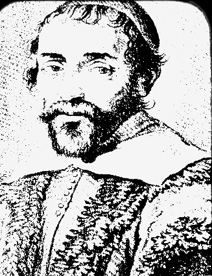| Profile | Major Works | Resources |
Pierre Gassendi, 1592-1655.

Brilliant Provenšal priest, scientist and philosopher. Pierre Gassendi is best-known as an advocate and popularizer of the doctrines of the ancient Epicurean School. He advanced Epicurean "atomism" as the basis of a new physical and social science (although he cautiously wrapped the heretical doctrine with layers of Christian tinsel and a modest skepticism).
Gassendi broke into print in 1624 with a direct assault the Aristotelian "logical" methods of reasoning that had been the exclusive tool of the Scholastics. Like his contemporary Francis Bacon, Gassendi insisted on the need to base knowledge on empirical evidence -- and showed (paradoxically) how empirical exceptions could always punctuate logical arguments, no matter how tight.
Although very influential and widely toasted in his youth, Gassendi's empiricist doctrines would soon be challenged by Descartes's rationalist revolution. Gassendi redirected his guns from the Scholastics to the Cartesians in several works (e.g. 1641, 1644), but was largely unsuccessful. Gassendi was doomed to oblivion in France. However, in England, Gassendi's doctrines flowed on (he was an important influence on Newton). Gassendi's claim as one of the fathers of the "Scientific Revolution" of the 17th Century cannot be assailed.
It is Gassendi's resurrection of the Epicurean ethical doctrine of hedonism (esp. in his Syntagma) that most interests us here. Setting issues of faith to the side, Gassendi asserted that in other spheres of life, the pursuit of pleasure and avoidance of pain is the ultimate virtue. He appealed to psychological "evidence" to support the idea that Divine Providence was involved in this (Would God have hotwired pleasure and pain into our sensations, had he not wished us to follow them?)
However, like Epicurus before him, Gassendi realized that his hedonistic doctrine could easily be (mis?-)interpreted as an excuse for sensual and material pleasure-seeking (France had just emerged from forty years of religious strife -- expressions of such impiety were still dangerous). To sidestep this, Gassendi placed the emphasis on our reasoning. More precisely, Gassendi actually defined "reason" as the ability to distinguish what is "truly" pleasurable and what is "truly" painful -- and defined "virtue" as the ability to mold our actions to achieve those ends. But what does "truly" mean? Like Epicurus, once again, Gassendi defines a "true" pleasure as one which is of high quality and long-lived (as opposed to intensely, short-lived "fun"). This part of the argument is also substantiated by Divine Providence: would God have given us the ability to "reason" had he not wished us to use it?
Interestingly, Gassendi applied his doctrine to social philosophy. In particular, he noted it is in the "true" interest of the hedonistic man to secure the means to long-lived pleasure, i.e. he needs to stay alive as long as possible, be able to hold to his property, etc. In a Hobbesian lurch, Gassendi says that it is thus "reasonable" for men to support any government which is strong enough to end strife and secure people and property while at the same time giving people the liberty to pursue their own interests and passions. Interestingly, Gassendi plumps down in favor of a single centralized power (rather than letting power be diluted by checks-and-balances constitutionalism) as the most effective means of achieving this. He recognizes the potential for abuse -- and thus emphasizes the importance of "enlightening" the king (i.e. make him realize that his self-interest is not in tyranny). Gassendi looks to the great hero of his youth, King Henry IV of France, as the example to follow. Gassendi's defense of absolutism endeared him to Cardinal Richelieu, who engineered his appointment to the Royal College in Paris in 1645.
|
Major Works of Pierre Gassendi
|
|
HET
|
|
Resources on Pierre Gassendi
|
All rights reserved, Gonšalo L. Fonseca
